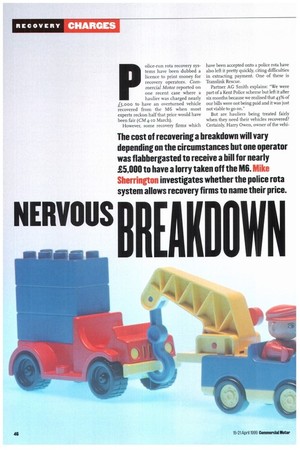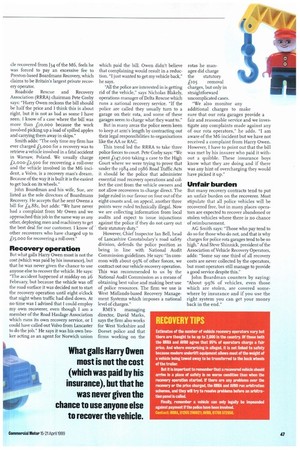NERVOUS BREAK YIN The cost of recovering a breakdown will
Page 48

Page 49

If you've noticed an error in this article please click here to report it so we can fix it.
vary depending on the circumstances but one operator was flabbergasted to receive a bill for nearly 15,000 to have a lorry taken off the M6. Mike Sherrington investigates whether the police rota system allows recovery firms to name their price. police-run rota recovery systems have been dubbed a licence to print money for recovery operators. Commercial Motor reported on one recent case where a haulier was charged nearly L3,000 to have an overturned vehicle recovered from the M6 when most experts reckon half that price would have been fair (CM 4-10 March).
However, some recovery firms which have been accepted onto a police rota have also left it pretty quickly, citing difficulties in extracting payment. One of these is Translink Rescue.
Partner AG Smith explains: "We were part of a Kent Police scheme but left it after six months because we realised that 43% of our bills were not being paid and it was just not viable to go on.
But are hauliers being treated fairly when they need their vehicles recovered? Certainly, Harry Owen, owner of the vehi cle recovered from J34 of the MG, feels he was forced to pay an excessive fee to Preston-based Boardmans Recovery, which claims to be Britain's largest private recovery operator.
Roadside Rescue and Recovery Association (RRRA) chairman Pete Cosby says: "Harry Owen reckons the bill should be half the price and I think this is about right, but it is not as bad as some I have seen. I know of a case where the bill was more than ito,000 because the work involved picking up a load of spilled apples and carrying them away in skips."
Smith adds: "The only time my firm has ever charged £5,000 for a recovery was to retrieve a vehicle involved in a fatal accident in Warsaw, Poland. We usually charge L2,00012,50 o for recovering a roll-over and the vehicle involved in the MG incident, a Volvo, is a recovery man's dream. Because of the way it is built it is the easiest to get back on its wheels."
John Boardman and his wife, Sue, are listed as the sole directors of Boardmans Recovery. He accepts that he sent Owens a bill for £4,881, but adds: "We have never had a complaint from Mr Owen and we approached this job in the same way as any other, deploying men and machinery to get the best deal for our customer. I know of other recoverers who have charged up to £15,000 for recovering a roll-over."
Recovery operation
But what galls Harry Owen most is not the cost (which was paid by his insurance), but that he was never given the chance to use anyone else to recover the vehicle. He says: "The accident happened at midday on 26 February, but because the vehicle was off the road surface it was decided not to start the recovery operation until eight o'clock that night when traffic had died down. At no time was I advised that I could employ my own recoverer, even though I am a member of the Road Haulage Association which runs its own recovery service, or I could have called out Volvo from Lancaster to do the job." He says it was his own broker acting as an agent for Norwich union which paid the bill. Owen didn't believe that complaining would result in a reduction. "I just wanted to get my vehide back," he says.
"All the police are interested in is getting rid of the vehicle," says Nicholas Blakely, operations manager of Delta Rescue which runs a national recovery service. "If the police are called they usually turn to a garage on their rota, and some of these garages seem to charge what they want to."
But in many areas the police seem keen to keep at arm's length by contracting out their legal responsibilities to organisations like the AA or RAC.
This trend led the RRRA to take three police forces to court. Pete Cosby says: "We spent £147, oo o taking a case to the High Court where we were trying to prove that under the 1984 and 1986 Road Traffic Acts it should be the police that administer essential road recovery operations and coiled the cost from the vehicle owners and not allow recoverers to charge direct. The judge ruled in our favour on four out of the eight counts and, on appeal, another three points were ruled technically illegal. Now we are collecting information from local audits and expect to issue injunctions against the police if they do not carry out their statutory duty."
However, Chief Inspector Ian Bell, head of Lancashire Constabulary's road safety division, defends the police position as being in line with National Audit Commission guidelines. He says: "In common with about 99% of other forces, we contract out our vehicle recovery operation. This was recommended to us by the National Audit Commission as a means of obtaining best value and making best use of police resources. The firm we use is West Midlands-based Recovery Management Systems which imposes a national level of charges."
RMS's managing director, David Marks, says the firm also works for West Yorkshire and Dorset police and that firms working on the rotas he manages did charge the statutory £105 removal charges, but only in straightforward uncomplicated cases.
We also monitor any additional charges to make sure that our rota garages provide a fair and reasonable service and we investigate any complaints made against any of our rota operators," he adds. "I am aware of the MG incident but we have not received a complaint from Harry Owen, However, I have to point out that the bill was met by his insurer who paid it without a quibble. These insurance boys know what they are doing and if there was any hint of overcharging they would have picked it up."
Unfair burden
But many recovery contracts tend to put an unfair burden on the recoverer. Most stipulate that all police vehicles will be recovered free, but in many places operators are expected to recover abandoned or stolen vehicles where there is no chance of reimbursement.
AG Smith says: "Those who pay tend to do so for those who do not, and that is why charges for police rota garages tend to be so "And Steve Shinnick, president of the Association of Vehicle Recovery Operators, adds: "Some say one third of all recovery costs are never collected by the operators, but most operators still manage to provide a good service despite this."
John Boardman counters by saying: "About 99% of vehicles, even those which are stolen, are covered somewhere by insurance and if you use the right system you can get your money back in the end."












































































































